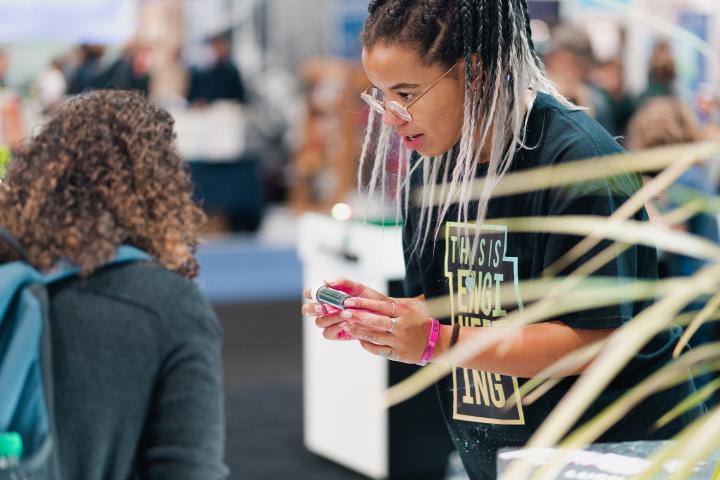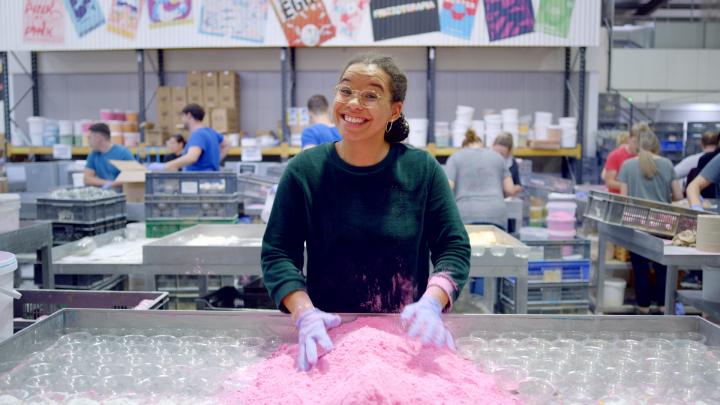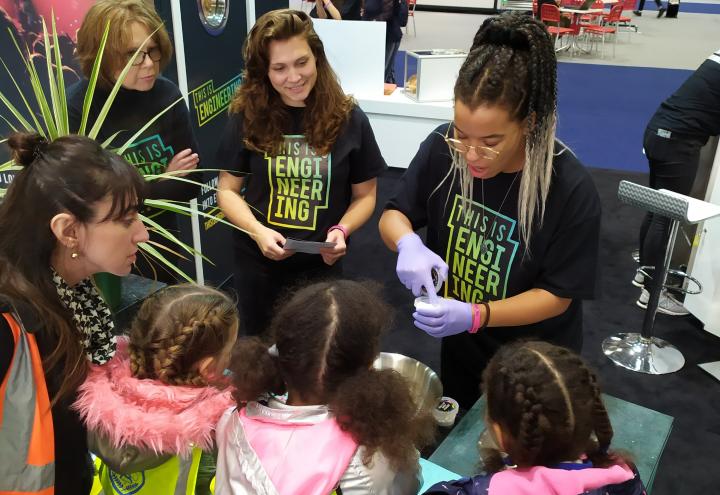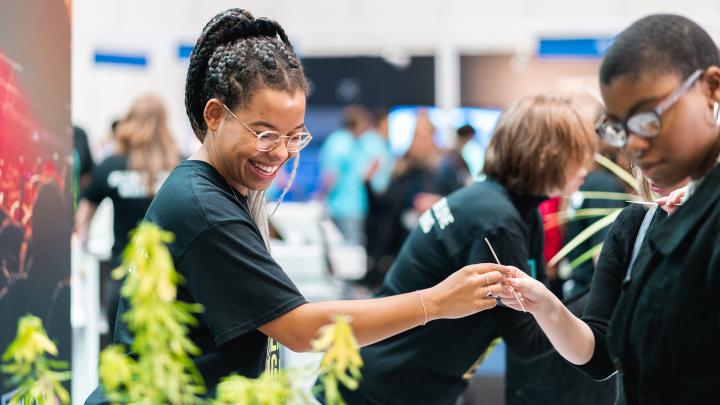Building a more sustainable future
Engineering graduate Olivia Sweeney talks to Edit about being listed in the Top 100 Influential Women in Engineering, the link between gender equality and sustainability, and her inspirations.

What made you want to become an engineer?
I didn’t know I wanted to be an engineer when I was growing up, or even really what a chemical engineer was. All I knew was I wanted to help build a more sustainable future. When I read about the skills a chemical engineer would acquire I felt that these were perfect for being able to make a tangible change in the field of sustainability. After completing my Masters in Chemical Engineering in 2017 at Edinburgh I was still passionate about building this green future, so I took my role at Lush Fresh Handmade Cosmetics.
What has your role as an ethical buyer involved?
I am responsible for the sourcing of synthetic ingredients that are used in Lush fragrances. This means I look after them, so I need to check our volumes and pricing as well as compliance with our environmental and ethical policies. Where engineering comes in is when we have to come up with creative solutions to help our inventors create something new, or when an ethical/environmental concern means we want to manufacture a material in a different way. I love it when we make things from 'waste'.
My job title isn’t chemical engineer but I definitely use these skills massively in my job. Problem solving is what you do as an engineer, building an achievable solution to a problem, and that is what I do with the materials I am responsible for at Lush. And, as opposed to financing being the key driver, environment and ethics are on equal if not more important footing.

How did your time at Edinburgh influence your career choice?
Beyond my qualification my time at Edinburgh gave me a global mindset. Pushing me to find a role in a company that thinks and acts locally as well as globally. Edinburgh as a city and a university mixes tradition and innovation. I think this is key when working towards a regenerative future. There are indigenous and traditional techniques that we can learn from as well as cutting-edge technological solutions.
What have been the highlights and challenges since graduating?
It is always hard after graduating, getting a job seems like the beginning and end of all things. I was lucky and got offered two jobs the week I graduated so I had choice. I chose Lush because I wasn’t sure a graduate scheme was the right fit for me. Having been in education for the last 18 or so years a graduate scheme felt like a continuation of that, and I was ready for something new.
Getting my job was definitely a highlight but it wasn’t easy. I had to change my approach to looking and applying for jobs, and also actually think for myself as to what I wanted as opposed to being told what was expected of me.
Being selected to be an ambassador for the Royal Academy of Engineering This is Engineering campaign, and the many opportunities that have stemmed from this, has been a massive highlight. Going to parliament, meeting Lewis Hamilton and being awarded a place on the Top 100 Most Influential Women in Engineering are all highlights too.
The challenge has been balancing this with work, for which sometimes I travel extensively, and life. I have friends that live all over the world that I want to stay in touch with. How do I fit this in and afford it?
Learning how to live in the real world and not in school is a challenge. I want to keep learning and growing, but I am now setting my own challenges, deadlines and goals. It is hard to learn what is enough, too much or just enough.
I have recently decided to take a new job. This has been a challenging decision. Taking a job after graduating is easy, you have nothing to lose and everything to gain. Lush has been an amazing start to my career, and it is a very cool place to work. It is hard to leave, but I am taking the leap and am excited for my new role and the opportunities it will bring.
The 2020 Women and Girls in Science Day's theme this February was "Investment in Women and Girls in Science for Inclusive Green Growth". What does this mean to you?
I think the intersectionality of gender equality and sustainability, may this be climate justice, renewable energy or water scarcity, is very interesting and often overlooked.
As with everything, diversity of thought and engagement is vital in building a solution and a future that everyone feels that they belong too, is invested in and will work and fight to maintain, or maybe even improve.
Even climate change is not gender neutral. We often see that the effects of climate change disproportionately affect women, yet when we see who is responsible for building solutions, the voices in the room at events such as COP (the United Nations Conference of the Parties) are rarely representative.
This theme is important to me, the green/sustainability sector is emerging and coming to the mainstream for the first time. There is widespread engagement, so we need to take advantage of this and have everyone, including women, involved equally from the start, learning from our mistakes and building something better.

What would you say to schoolgirls thinking about studying engineering?
Do it! It is an exciting, diverse and rewarding field of work. It is hard work, but it is not as scary as some people make it out to be. It is not all hard hats and cars. I recently read about a chemical engineer who is working on recycling textiles to help solve the problems of fast fashion. Engineering provides you with a great skill set even if you do change your mind. You can be hands on and practical if you want, or you can be more theoretical/computer based.
It can allow you to be part of building the future, and (not to be cheesy) making ideas into a reality, and that is pretty amazing.
Why is equality and diversity in engineering important?
To me diversity is a no brainer in all industries but particularly engineering. As I said, engineers are responsible for building the realities of tomorrow. How can you expect for this world to work for everyone if a single type of person is making it?
You already read about face recognition suffering from racial bias, and voice recognition struggling with accents. This is not for lack of technology but a lack of diversity in those building it.
Diversity in thought, opinion, ideas and background is only advantageous. An engineer’s job is to build the best solution; how can the best/strongest solution be built if you are excluding a group of people that will be using it?

How does it feel to be listed in the Inclusive Boards’ 100 Most Influential Women in Engineering?
It is a massive privilege and was a surprise to receive such recognition so early in my career. Quite often you just keep your head down and are doing your thing, so it is great to know that what I am doing and the way I am doing it is resonating with others.
In what way would you like to instigate positive change to make the world a better place?
I would like to think I am helping to make the engineering discipline a little bit more appealing. I would love to be part of building an inclusive distributive future. My smallest hope is that the generation of women below me take up whatever discipline they chose because that is their choice, and not what they are pressured or expected to do.
How do you feel when you return to Edinburgh?
I love Edinburgh and Scotland as a whole; I am so grateful for the time I spent there. I haven’t been up much since graduating, but I want to this year. It is a funny sense of nostalgia on returning. Student life isn’t really life, so it feels different going back and things have changed since I was last there, so you begin to reminisce, and it has only been two and a bit years since I left.
One great thing was when I returned for a women in engineering event organised by the University only about six months after I graduated. The diversity of faces looking back at me from the audience was far greater than any class I sat in while a student. So, if the changes that I see all help to build a more inclusive space, I am all for them!
What is your main inspiration and why?
That is a hard question to answer. I think my main inspiration is wanting to make things better for people and for the planet. I think I want to make my parents proud and live up to expectations and be the best I can be. But I also care about so many things and see the flaws in a lot. I don’t just want to sit idle but try and make things a little better, ideally globally but if not for my immediate community.
If you could meet one person, who would that be and what question would you ask them?
There are lots of people doing inspirational things, and because of the opportunities I have been given I am meeting lots of them and getting to ask these questions.
If I am thinking women in STEM, it would be Hedy Lamarr. She is awesome. She was a Hollywood star and invented radio guidance for torpedoes in World War II that led to the invention of Bluetooth and Wi-Fi. She was beautiful and multitalented and sadly didn’t receive the credit she was due for her work. I would ask her, “How do you balance success in two different worlds?”
Another just generally badass woman who inspires me is Olive Morris. She died young, but achieved so much and, as is often the case, is overlooked by history. She campaigned for black women’s rights in Brixton in the seventies. I would ask her, “How can you be so fearless so young?”
Find out more
Read more about Olivia Sweeney in the Edit 2018 women in engineering feature

